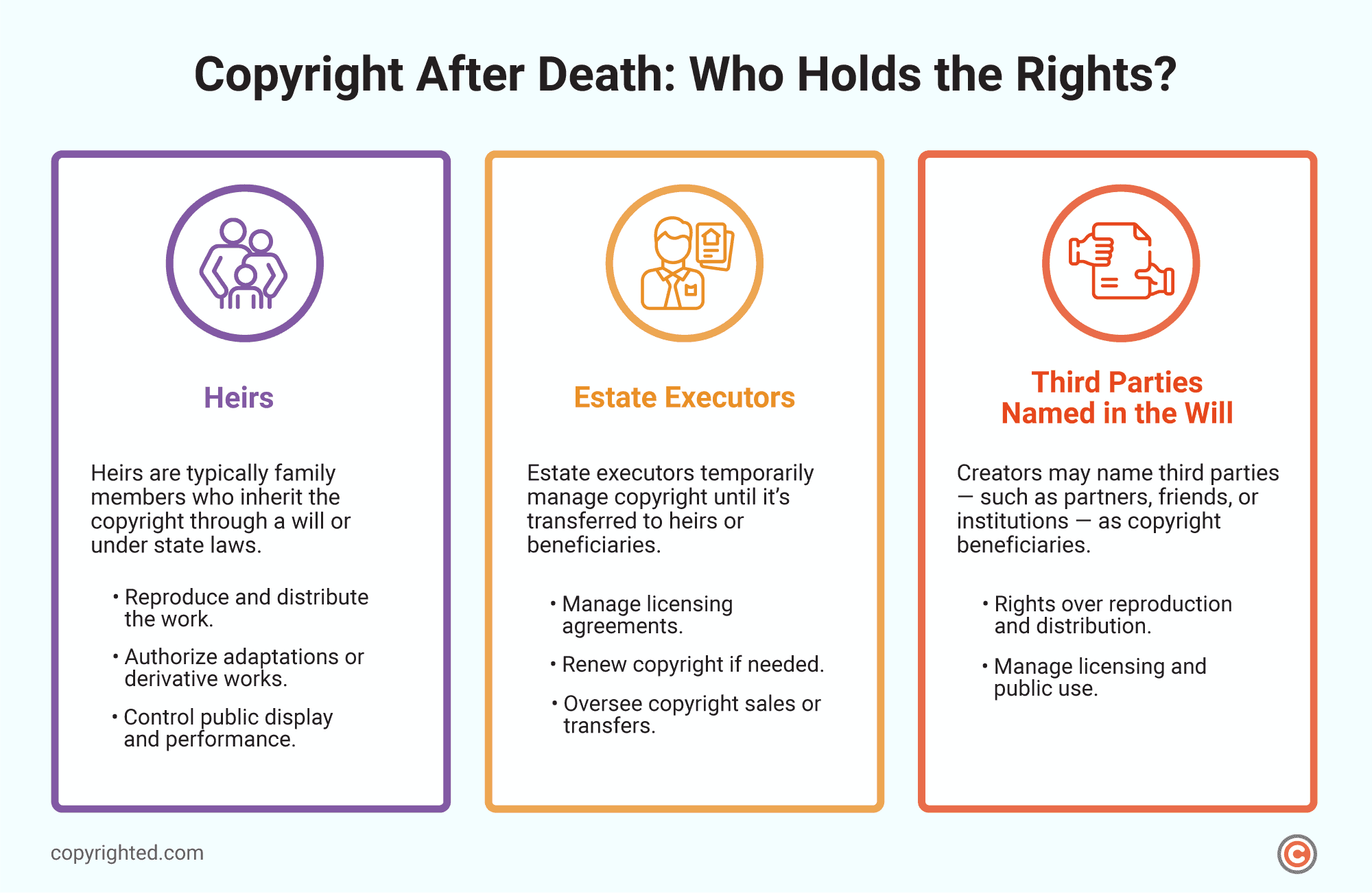Copyright doesn’t simply vanish when an author dies—it extends beyond their lifetime, often causing complications for heirs and businesses.
This can result in legal entanglements, unexpected costs, or even lost revenue from the deceased’s works.
Understanding how copyright works after death is key to protecting a creator’s legacy and properly managing their work. This article covers the essentials of posthumous copyright to help you navigate it confidently.
- Copyright transfers to heirs or an estate after the creator’s death, remaining protected under the law.
- Properly detailing copyright distribution in a will prevents disputes and helps heirs manage creative assets effectively.
- The copyright duration varies based on factors like individual, joint, or corporate authorship, often lasting decades posthumously.
Table of Contents
What Happens to Copyright After a Creator Dies?
When a creator dies, their copyright typically transfers to their heirs or estate, keeping these rights active after death under 17 U.S. Code § 201.
If the creator left a will, copyright rights can be directly assigned to specific heirs or beneficiaries, allowing them control over the copyright as they would with other assets.
To prevent ambiguity, the will should clearly state how the copyright will transfer, detailing who will inherit the rights to reproduce, distribute, and license the work. A well-defined will helps avoid disputes by specifying exactly who receives these rights.
Without a will, copyright transfers according to state inheritance (or intestacy) laws, which often prioritize spouses, children, and other close relatives. For instance:
- Spouses and Children: In many states, a deceased creator’s copyright is inherited by the spouse or split between the spouse and children.
- Other Relatives: If no spouse or children are present, the copyright may go to parents, siblings, or other relatives, depending on state law.
Once the copyright is part of the estate, the estate executor or manager oversees these rights, which may involve licensing, renewing, or selling the copyright as outlined in the will or agreed upon by the beneficiaries.
Who Controls Copyright After Death of the Author or Artist?

When an author or artist passes away, their copyright is transferred to designated beneficiaries, including heirs, estate executors, or third parties named in the creator’s will.
Those holding copyright after the creator’s death take on responsibility for the work’s commercial use, licensing, and protection.
This includes renewing or extending the copyright if needed, making decisions about public access, reproduction, or adaptation, and overseeing any income or royalties generated from the work.
The structured transition helps preserve and manage the creator’s work as a valuable asset under copyright law.
Heirs
Heirs are often family members—such as a spouse, children, or close relatives—who inherit the copyright through the will or under state intestate laws if no will exists. As copyright holders, heirs assume the exclusive rights the creator held, including:
- Reproducing and distributing the work.
- Authorizing adaptations or derivative works.
- Controlling the work’s public display and performance.
Estate Executors
If a creator’s estate has an appointed executor, this individual may temporarily manage the copyright until it’s formally transferred to heirs or beneficiaries. The executor’s tasks include:
- Managing licensing agreements or renewing the copyright.
- Ensuring any debts or obligations related to the copyright are fulfilled.
- Overseeing copyright sales or transfers as specified by the will or in the estate’s interest.
Executors are responsible for protecting and appropriately managing the copyright in the estate’s and its beneficiaries’ best interest.
Third Parties Named in the Will
In some cases, creators name third parties—such as business partners, friends, or institutions—as copyright beneficiaries. These designated parties then assume the exclusive rights provided by copyright law, including rights over reproduction, distribution, and licensing.
How Long Does Copyright Last After Death?
Copyright continues beyond the creator’s lifetime. According to 17 U.S. Code § 302, the length of copyright protection after the creator’s death varies based on several factors, primarily the creation date and the type of authorship.
Individual Authors
For works created by a single author, copyright generally lasts 70 years after the author’s death.
This standard, reinforced by the Copyright Term Extension Act of 1998 or Sonny Bono Copyright Term Extension Act, applies to most literary, musical, and artistic works created after January 1, 1978, which offers a lengthy period of protection for heirs or beneficiaries.
Joint Authors
If a work has two or more authors, called joint work, the copyright continues for 70 years after the last surviving author’s death. This provision allows the copyright to remain active until all contributing creators have passed, extending protection for works with multiple creators.
Works Made for Hire and Corporate Authorship
For work for hire or created by corporations, such as commissioned projects, copyright lasts either 95 years from the date of publication or 120 years from creation, whichever is earlier.
Frequently Asked Questions
Can copyright be inherited?
Yes, according to the U.S Copyright Office, heirs or beneficiaries can inherit copyright after the creator’s death, who then manage and benefit from the work.
Can you assign your copyright to someone in a will?
Yes, copyright can be assigned in a will, which gives named beneficiaries control over the creative rights of your copyright after you die.
Can copyright be split among multiple heirs?
Yes, copyright ownership can be divided among multiple beneficiaries, with each heir receiving certain rights over the work.
Who benefits financially from copyright after the creator’s death?
Heirs or designated beneficiaries benefit financially from copyright through royalties and control over licensing or sales.
Can heirs extend copyright beyond its typical expiration?
No, heirs cannot legally extend copyright, as it expires according to established terms based on the work type.


